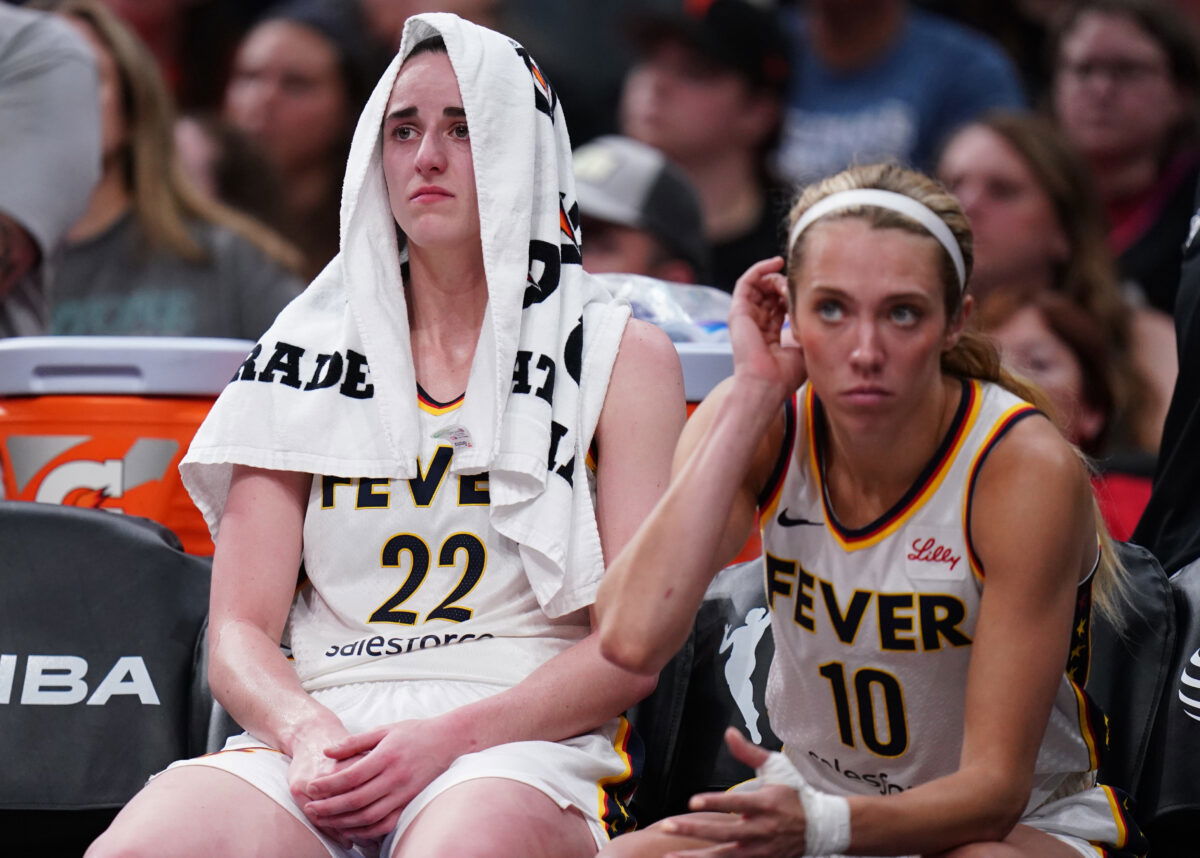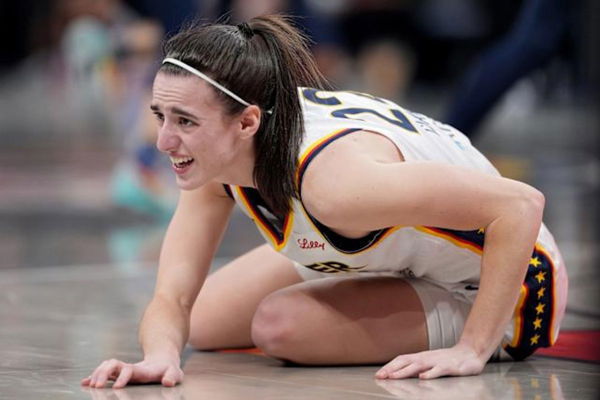
Imago
Jul 15, 2025; Boston, Massachusetts, USA; Indiana Fever guard Caitlin Clark (22) reacts on the bench after a play against the Connecticut Sun in the second half at TD Garden. Mandatory Credit: David Butler II-Imagn Images

Imago
Jul 15, 2025; Boston, Massachusetts, USA; Indiana Fever guard Caitlin Clark (22) reacts on the bench after a play against the Connecticut Sun in the second half at TD Garden. Mandatory Credit: David Butler II-Imagn Images

Imago
Jul 15, 2025; Boston, Massachusetts, USA; Indiana Fever guard Caitlin Clark (22) reacts on the bench after a play against the Connecticut Sun in the second half at TD Garden. Mandatory Credit: David Butler II-Imagn Images

Imago
Jul 15, 2025; Boston, Massachusetts, USA; Indiana Fever guard Caitlin Clark (22) reacts on the bench after a play against the Connecticut Sun in the second half at TD Garden. Mandatory Credit: David Butler II-Imagn Images
Caitlin Clark, now an All-Star captain and local hero ahead of the Indianapolis weekend, is changing what it means to be a WNBA star. However, her season is becoming less about her record-breaking performances and more about the concerning trend of injuries. Just days before the much-anticipated showdown against Napheesa Collier and Co., the Indiana Fever guard grabbed her right groin during a game against the Connecticut Sun, marking her third major injury this season. This series of physical challenges is a stark contrast to her college and early professional career, where she never missed a single game. It seems all the body checks and elbows-to-the-face have taken their toll on CC. This has sparked a heated debate among her loyal fans. Some even suggested taking a completely different career path to CC.
Watch What’s Trending Now!
Many of her die-hard fans seem to believe that these injuries are not just a result of bad luck. They see them as a direct result of the WNBA not doing enough to protect its star player, especially with the inconsistent officiating. One frustrated fan shared their thoughts, saying, “If WNBA veterans keep fouling Caitlin Clark to throw her off her game, maybe she’d really shine in a league that appreciates skill and personal space, like the #Euroleague. Just think about the offense!” This sentiment reflects a common hope that a different league could provide Clark the freedom to showcase her talent without the constant physical pressure. Another fan simply expressed, “CC, I love you, but maybe you should consider Europe.”
Many fans say the league is unfairly singling out Caitlin Clark. “This has been a theme all season,” one observer pointed out, while another chimed in, “The league has let her down; the officiating is completely biased against her, and her team isn’t giving her the support she needs. No other team or coach lets their star player take this kind of punishment. You’d never see it happen to A’ja, Stewie, or Phee. Only Caitlin Clark is being restricted on the court.” A former coach even shared their thoughts, saying, “I completely agree, and I’m a long-time coach who never let my team question the refs. But this league is unlike anything we’ve ever seen. Just look at Aliyah Boston tonight. It’s like WWE out there.”
If WNBA veterans insist on fouling Caitlin Clark to disrupt her rhythm, maybe she’d truly shine in a league that values personal space & skill, like the #Euroleague. Imagine the offense! #CaitlinClark #WNBA #Basketball #EuropeanBasketball https://t.co/RQHRpzUYkp
— John D. Elmstedt Jr. (@Johnnystill1) July 16, 2025
This frustration highlights the WNBA’s apparent dependence on Clark. “They’ve got a golden goose and they keep trying to squeeze the life out of it,” one person commented, while another added, “If she’s out for the season, just watch the ratings plummet. The ratings for the so-called All-Star game will tank. They’re too clueless to see she’s the cash cow!” Many of her supporters strongly believe that Clark is the main reason for the league’s exponential growth in recent years. “Caitlin Clark is the only reason money is being poured into the future of the WNBA,” a social media user declared.
It’s clear that not everyone is on the same page when it comes to the reactions surrounding Clark. Some folks are quick to point fingers at the league, while others argue that Clark herself contributes to the heated atmosphere. One commenter fired back, saying, “It seems like no one actually watches the full games; they just throw out opinions without knowing the whole story. She was untouched on that play, slipped when she first hurt her groin, and her shooting is terrible, yet she complains to the refs all game. It’s time to grow up and stop blaming others!” Meanwhile, another critic has labeled her an “entitled br–“ who constantly waves her hands and whines about everything, making it tough to cheer for her, especially since she pulled the same antics in college.
On the other side, fans have been arguing for the majority of the season that the officiating issues are a league-wide problem, and not just a Caitlin Clark problem. “Bad officiating across the board. Players are taking real hits in the paint, over and over again. They should hire NBA officials full-time to step up the game.” Another fan added, “Sure, the officiating is bad, but let’s not pretend she’s the only one dealing with these clueless refs.” Then there are the more extreme opinions, with some suggesting that there are racial undertones in how the league treats its players. One person controversially stated that the WNBA has turned into the “Women’s National Racist Basketball Association,” claiming the league has “let the th— take over the game.” These inflammatory comments do cross the line at times, but the sentiment behind them is understandable. The refereeing standards have remained poor, despite the league earning more revenue than it has ever done in its history. The refs are barely paid a fraction of what their counterparts in the NBA earn. Simply put, Less money = worse quality.
The lively debates happening online really show just how deeply fans care about Clark and the WNBA. They also reveal a mix of opinions on the hurdles the league is facing.
Is Europe An Option or Just a Dream for Fans?
The idea of Caitlin Clark leaving the WNBA for European basketball came from genuine fan frustration, calls for a realistic look at how practical it really is, and what it could mean in the long run. Fans often see European leagues as a haven for smart, skill-focused play, where strategy and finesse take the spotlight over sheer physical strength. They believe this could not only lower Clark’s risk of injury but also let her showcase her incredible offensive talent without the fear of someone punching her in the face (quite literally). Plus, there’s the tempting possibility of big contracts from top European teams. For a player like Clark, her WNBA’s endorsement deals likely out-bank anything she’d earn in Europe.

The suggestion of Caitlin Clark abandoning the WNBA for European basketball, though an understandable outpouring of fan frustration, necessitates a pragmatic examination of its feasibility and far-reaching implications.
European Proposition from Fan Perspectives
Enthusiasts often characterize European leagues as a sanctuary for highly cerebral, skill-centric play, where strategic offense and refined technique take precedence over brute physicality. This, they believe, would not only mitigate Clark’s injury risk but also allow her unparalleled offensive artistry to flourish unhindered. There are also potentially lucrative contracts from elite European clubs, although for a player of Clark’s stature, her vast endorsement deals, linked to the WNBA’s massive platform, likely dwarf any potential European playing salary alone.
Analysis: Challenges and Realities
However, making a sudden switch to Europe comes with some serious challenges. Clark signed a rookie contract with the Indiana Fever, locking her into the team for now. If she were to break that agreement to play overseas, she could face hefty penalties and possible legal issues from the WNBA. It’s not as simple as just changing leagues in the middle of her career. As one would say, this ain’t soccer.
Moreover, Clark’s significant influence has shown the WNBA into a great era of visibility and financial success. While the EuroLeague offers top-notch competition, moving there would significantly reduce her exposure in the vital North American market, which could threaten her impressive endorsement deals.
It’s not just about switching leagues. Players have to adjust to new languages, fit into unfamiliar teams, and manage brutal travel routines. Many WNBA players do take the opportunity to play overseas during the offseason to increase their earnings, but committing to that year-round at the expense of their WNBA careers is a whole different ballgame. As European coach Nikolai Gospodinov pointed out, “Coaches want their players to maintain tactical discipline on the court and stick to the system.” Yet, when it comes to tactical fouling, “European basketball is no different from American basketball,” Dutch coach Thomas Roijakkers noted. The upcoming WNBA Collective Bargaining Agreement (CBA), expected to finalize before the 2026 season, will shape Clark’s long-term future in the league. Reports show Clark is taking an active role in the negotiations, which focus on key player demands. The most widely recognized include the following;
Firstly, Increased Salaries: With the league’s popularity skyrocketing and those massive multi-billion dollar media rights deals, players are pushing hard for a bigger slice of the growing revenue pie.
Next is Guaranteed Charter Travel: This is a hot topic about boosting player health, cutting down on travel fatigue, and improving overall well-being.
Lastly, Flexibility on Prioritization: The current policy can hit veteran players hard for not showing up by certain deadlines, which often clash with their overseas commitments. There’s a good chance this will be reconsidered to allow for more flexibility. While Clark isn’t directly affected by the current prioritization rules, the wider discussions in the CBA about player autonomy and working conditions could really address the concerns her fans have about the league environment.
In the end, while it’s totally understandable that fans are frustrated and want Clark to consider a European career, especially given her injury history, the reality is a lot more complicated. Moving abroad is unlikely due to her existing contracts, the potential hit to her brand, and the promising changes expected from the new CBA, which aims to improve player conditions and pay in the WNBA. The way forward probably involves ongoing efforts for better officiating, smart load management by the Fever, and a new CBA that genuinely improves player safety and well-being in the domestic league.
This situation shows the tricky balance between the WNBA’s growing popularity and the need to protect its most valuable players. As Caitlin Clark works through her challenging season, the discussions about her treatment and career path are sure to continue, influencing her journey and also, potentially reshaping the WNBA with its new agreements coming into play.

